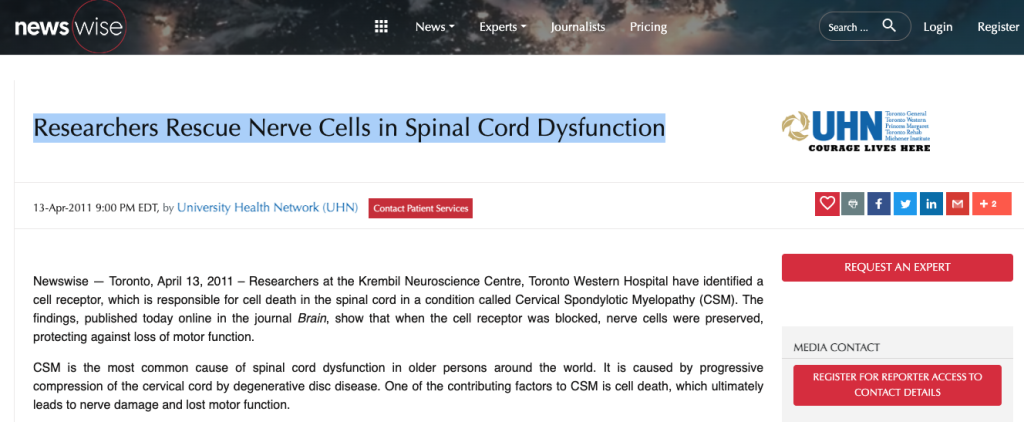
Newswise — Toronto, April 13, 2011 – Researchers at the Krembil Neuroscience Centre, Toronto Western Hospital have identified a cell receptor, which is responsible for cell death in the spinal cord in a condition called Cervical Spondylotic Myelopathy (CSM). The findings, published today online in the journal Brain, show that when the cell receptor was blocked, nerve cells were preserved, protecting against loss of motor function.
CSM is the most common cause of spinal cord dysfunction in older persons around the world. It is caused by progressive compression of the cervical cord by degenerative disc disease. One of the contributing factors to CSM is cell death, which ultimately leads to nerve damage and lost motor function.
A cell receptor is a molecule on the surface of the cell that instructs the cell to die when it has been injured. Using animal models and human spinal cord tissue, Dr. Michael Fehlings, the lead author of the study, discovered that the activation of the cell receptor Fas is a contributing factor to cord compression and nerve cell death. When this Fas receptor was blocked in animal models with CSM, motor function improved and cell-death was reduced.
“This novel evidence suggests that the Fas receptor can be targeted in people with CSM to stop neural degeneration,” said Dr. Fehlings. “This exciting discovery can lead to the development of a therapy that will compliment surgical decompression and ultimately lead to neuroprotective theraputics for people suffering with CSM.”
The average age for patients to be diagnosed with CSM is 50 years old. Symptoms often develop insidiously and are characterized by neck stiffness, arm pain, numbness in the hands, and weakness of the hands and legs. Left untreated, CSM could result in paralysis.
Previous studies by Dr. Fehlings have shown that surgery is currently the best option to address the symptoms of CSM.
Dr. Michael Fehlings is the Medical Director of the Krembil Neuroscience Centre and heads the Spinal program at the Toronto Western Hospital. In addition, Dr. Fehlings is a professor of neurosurgery at the University of Toronto; is a scientist at the McEwen Centre for Regenerative Medicine and a McLaughlin Scholar in Molecular Medicine.
About Krembil Neuroscience CentreThe Krembil Neuroscience Centre (KNC), located at Toronto Western Hospital, is home to one of the largest combined clinical and research neurological facilities in North America. Since opening in 2001, KNC has been recognized as a world leader through its research achievements, education and exemplary patient care. The centre focuses on the advancement, detection and treatment of neurological diseases and specializes in movement disorders, dementias, stroke, spinal cord injury, blinding eye diseases, epilepsy and cancer-related conditions.For more information please visit www.krembil.com
About University Health Network University Health Network consists of Toronto General, Toronto Western and Princess Margaret Hospitals. The scope of research and complexity of cases at University Health Network has made it a national and international source for discovery, education and patient care. It has the largest hospital-based research program in Canada, with major research in cardiology, transplantation, neurosciences, oncology, surgical innovation, infectious diseases, and genomic medicine. University Health Network is a research hospital affiliated with the University of Toronto. For more information please visit www.uhn.ca
